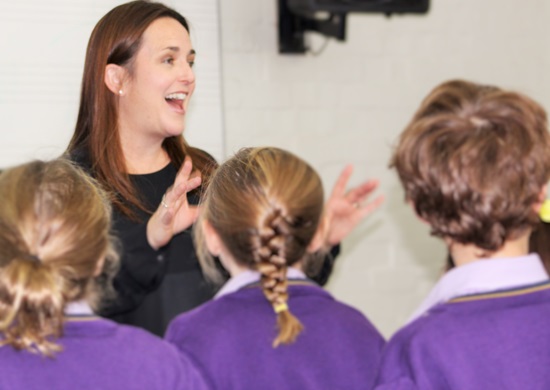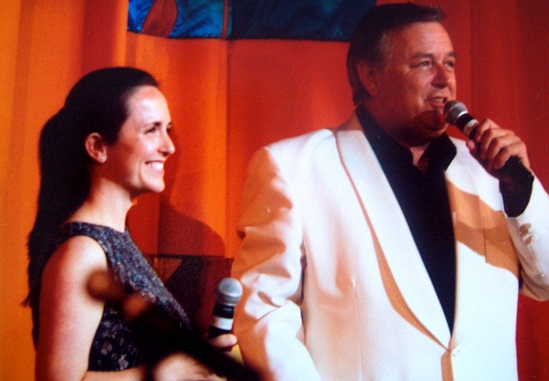
Students in Prep to Year 4 at Wesley College’s Elsternwick Campus are discovering the joys, and benefits, of singing. The 25 students are lunchtime members of a singing club established at the school this year with the help of vocal program tutor Anna Young.
Ms Young, who was a regular guest on Young Talent Time, a TV variety show that ran from 1971 to 1988 and is a senior singing and dancing teacher at the Johnny Young Talent School, has a longstanding family connection with Wesley and tutors in Elsternwick’s Junior School vocal program.
Daughter of Young Talent Time host Johnny Young, Ms Young proposed the singing club after teaching several vocal students at the Elsternwick Campus and discovering that other students were showing a strong interest in singing. ‘I’d been teaching a number of young singers at the Elsternwick Campus one-to-one and realised their friends also seemed interested,’ Ms Young said. ‘When I suggested inviting students from Prep to Year 4 to join a lunchtime singing club, Elsternwick’s Head of Junior School Kieran McCrohan was quick to see the benefits, and agree.’

Research reveals benefits
Those benefits are many. Research by Oxford University’s Eiluned Pearce, Jacques Launay and Robin Dunbar shows that singing in a group or choir ‘mediates fast social bonding’ – in other words, it’s a great ice-breaker that enables children to feel they belong. ‘Connectedness and a feeling of belongingare important factors, among many others, that are necessary if students are to learn effectively,’ Mr McCrohan said.
Pearce, Launay and Dunbar, who studied the social dynamics of students in newly formed classes in singing, crafts and creative writing over seven months, found that, ‘ (Singing) bypasses the need for personal knowledge of group members gained through prolonged interaction.’ Singing and music making also improve health and wellbeing, Pearce and Launay noted in an article in the Conversation.
Singing supports a transdisciplinary approach
‘When Anna proposed a singing club at Elsternwick, I was all for it,’ Mr McCrohan said. ‘The performing arts are an essential component of the curriculum at Wesley for a good reason. Our students learn within the framework of the International Baccalaureate Primary Years Programme (PYP), which has a strong emphasis on developing the whole child. The PYP provides a framework that is based on the understanding that children are active learners who best acquire knowledge through inquiry-based learning,’ Mr McCrohan said.
‘Singing and other performing arts are fundamental to the PYP, being incredibly well suited to building our students’ conceptual understanding and skills. It’s important to note that the PYP, for students aged three to 12, is grounded in a strong transdisciplinary framework that enables us to take an integrated approach to disciplinary learning - in literacy and numeracy, science and technology, history and geography and so on - that helps students to think and learn about the world, and themselves and their place in it, in a connected way.
‘What’s brilliant about the singing club is that our Junior School students are coming along at lunchtime to have fun, working with a top industry talent in Anna, in ways that are fundamentally transdisciplinary, and in doing that they’re actually learning to learn.’
Learning about singing, and much more
According to Ms Young, teaching a singing group builds teamwork skills and encourages the students to come together with a common interest and goal.
‘They learn about lots of literacy skills, from hearing how choral lyrics flow and how they fit with a melodic phrase, to eventually reading lyrics and melodies on a music staff. They learn about patterns, groupings and sequences, which can help them in their numeracy development.
‘Singing together, they learn about working cooperatively to create a harmonious sound. They develop their ability to concentrate, their memory, habits like making time to practice and a “can-do” attitude when they discover that taking a risk – say, singing solo or something like that – can really pay off.
‘They even develop a sense of responsibility and accountability. Simply turning up, on time, because the group needs all its singers, is a life skill to learn.
‘And of course, they do turn up, because singing is also amazingly satisfying, because it’s about creativity, it’s about being part of a group, it’s about joy in making and it’s about accomplishment. Sometimes in our singing club there are moments when our sound is really special, and I’ll ask them, “Did anyone notice anything happen just then?” and there’s always a few who will nod or raise their hand.’
Johnny Young said Anna and the staff at Wesley’s Elsternwick Campus should be commended for establishing the singing club. ‘Singing is just such a wonderful thing,’ he said. ‘My career has fundamentally involved music and the nurturing of young talent. It’s great to see Anna and Wesley planting seeds like this through the singing club.’
The students have had several opportunities to share their ‘special’ moments with the wider school community through assembly performances. ‘The Junior School has been transfixed with the performances from the singing group and, as a result, the numbers who want to be part of this experience have increased,’ Mr McCrohan said.
For Mr McCrohan, the Elsternwick singing club is both a means to an end and an end in itself. ‘We want our students to experience a true education that enables them to develop as knowledgeable and skilled people, as inquirers, thinkers, problem-solvers, collaborators and communicators who are principled, open-minded and caring, and who have a joy for learning.
‘Singing is an incredibly useful means to help us pursue that end, and it’s also a really valuable end in itself. The goal is not to create the next Tina Arena or Dani Minogue,’ Mr McCrohan said. ‘We’d be pretty happy if the singing club did eventually lead one of our students to pursue a career in singing, but success for us is to see every child engaged in their learning and enjoying every minute of it.’
